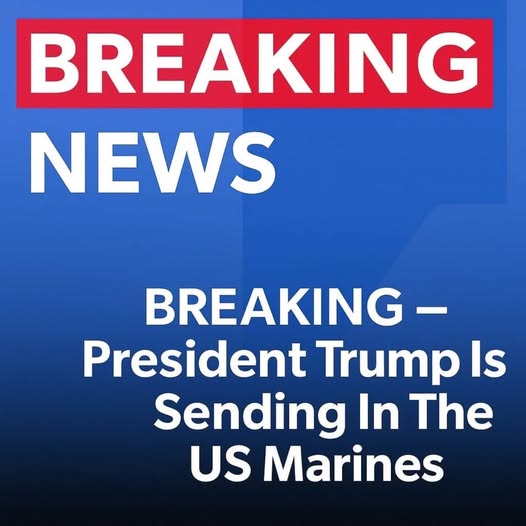The U.S. military has officially confirmed a highly contentious and closely watched move: 200 Marines are being deployed to Florida to provide critical logistical and administrative support to Immigration and Customs Enforcement (ICE). This announcement, which has already triggered waves of debate across political, social, and civil spheres, highlights the increasingly complex intersection between federal law enforcement operations and the military’s role in domestic affairs.
This deployment is not an isolated action. Rather, it forms part of a broader initiative designed to bolster ICE operations in high-pressure states, particularly those experiencing surges in immigration-related activity such as Texas and Louisiana. Officials describe it as a strategic decision aimed at providing organizational support, streamlining administrative processes, and ensuring detention facilities run efficiently during periods of high operational demand. The move, they stress, is entirely logistical: these Marines are not authorized to participate in enforcement actions. They will not be making arrests, conducting raids, or engaging in confrontations. Instead, their responsibilities are limited to non-combat support functions within ICE detention centers, which may include record-keeping, data management, supply chain oversight, and coordination of facility operations.
Nevertheless, the presence of uniformed military personnel working side by side with ICE agents has already ignited a storm of public backlash and concern. Civil liberties organizations, immigration advocates, and political commentators have all weighed in, questioning the necessity and optics of deploying military forces in domestic law enforcement settings. Critics argue that even if these Marines are restricted to administrative and logistical roles, their mere presence in detention centers — environments that are often contentious, emotionally charged, and politically sensitive — raises questions about the militarization of immigration enforcement and the potential for intimidation or psychological pressure on detainees.
Supporters of the deployment, however, emphasize the pragmatic benefits. They point out that ICE facilities often face significant operational pressures, including overcrowding, bureaucratic bottlenecks, and staff shortages. The addition of trained military personnel to handle administrative duties is framed as a measure to enhance efficiency and ensure detainees are properly processed and cared for under established federal guidelines. Proponents also argue that Marines bring discipline, organizational expertise, and logistical capability that can complement the work of ICE staff without stepping into enforcement or combat roles.
The decision has drawn attention to the legal frameworks governing the use of military personnel within the United States. The Posse Comitatus Act, for instance, restricts the use of the U.S. Army and Air Force in domestic law enforcement, though exceptions exist for National Guard units and specific support roles. Deployments like this one, which emphasize administrative and logistical functions, are legally permissible but nonetheless politically and socially charged. Analysts note that public perception may blur the distinction between support and enforcement, potentially escalating controversy and distrust among communities most directly impacted by ICE operations.
Media coverage of the deployment has further fueled debate. Images of Marines in uniform entering detention facilities, even if unarmed and performing clerical tasks, have provoked strong reactions on social media, ranging from alarm to outright protest. Advocacy groups have organized informational campaigns, town hall meetings, and demonstrations to voice concern over the merging of military presence and immigration enforcement, framing it as a step toward normalization of armed involvement in civilian policing operations.
Meanwhile, within the military and ICE ranks, operational planning emphasizes clear boundaries, strict adherence to chain-of-command protocols, and careful role definition. Marines assigned to the deployment undergo briefings to ensure they understand their non-combat responsibilities and the legal and ethical limits of their involvement. ICE officials have reportedly coordinated closely with military counterparts to delineate duties, prevent role confusion, and minimize risk of any unintentional engagement in enforcement activities.
This development has also sparked discussions in the political arena. Lawmakers from both sides of the aisle have voiced opinions, ranging from cautious support citing practical benefits, to vehement opposition highlighting civil rights implications. Some have questioned whether deploying military personnel, even in purely logistical capacities, sets a precedent that could expand in the future, potentially leading to the further integration of military resources into domestic law enforcement.
At the heart of the debate is the symbolic impact of seeing Marines — a branch traditionally associated with national defense and overseas operations — stationed within the United States to assist with domestic immigration matters. Observers note that symbolism matters as much as function; the sight of uniformed service members in ICE facilities sends a strong message to detainees, communities, and the broader public about government authority and the seriousness of enforcement operations.
As the deployment proceeds, attention will likely remain focused on both operational outcomes and public perception. Analysts will track whether the Marines’ presence materially improves administrative efficiency and detainee processing, while also monitoring community response, media framing, and potential legal challenges. Given the sensitivity surrounding immigration enforcement, the balance between practical support and public trust will be crucial.
Ultimately, the deployment of 200 Marines to Florida underscores the evolving nature of federal immigration enforcement, the logistical complexities faced by ICE, and the broader societal debate about the role of military forces in domestic operations. While these Marines will not engage in enforcement or combat, their presence is emblematic of the larger tensions between operational necessity, legal boundaries, and public perception — a tension that will continue to provoke discussion and scrutiny in the months ahead.
